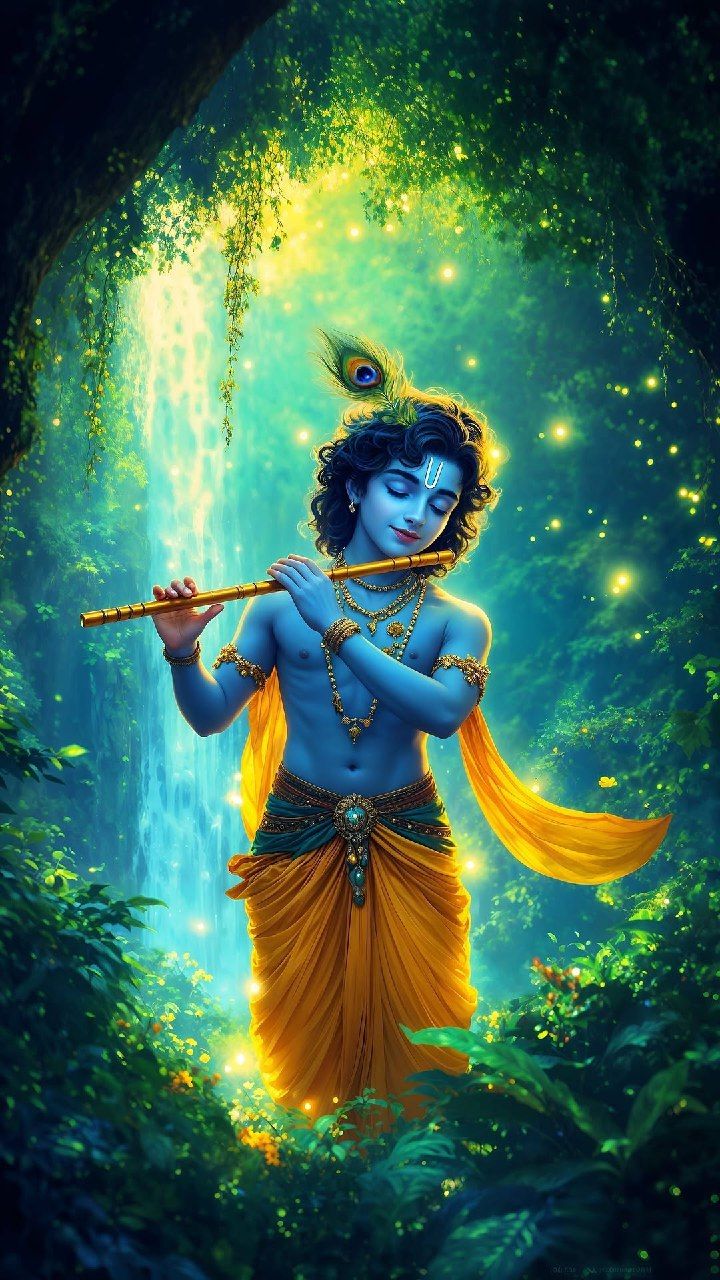10 Fascinating Facts About Lord Krishna That Will Inspire Your Soul
Lord Krishna, one of the most revered deities in Hinduism, is celebrated as the divine cowherd, supreme lover, philosopher, and charioteer. Known for his leelas (divine pastimes), wisdom, and charm, Krishna has inspired millions across centuries through Bhagavad Gita, Mahabharata, and countless devotional traditions. He embodies love, devotion, wisdom, and joy, making him central to spiritual, cultural, and social life in India. This article explores his history, fascinating facts, timeline, significance, FAQs, impact on daily life, and societal importance in a detailed, human-friendly way.
Krishna
| Characteristics : | Strength, Beauty, Knowledge, Opulence |
| Other Names : | Kanhaiya, Gopal, Keshava, Kanha |
| Principal Scriptures : | Mahabharata, Bhagawad Gita, Vishnu Purana, Bhagavata Purana |
| Mula Mantra : | Om Kleem Krishnaya Namah |
| Krishna Gayatri Mantra: | Om Daamodharayae Vidmahee Rukmani Vallabhaye Dheemahee Tanno Krishna Prachodayaath |
| Consort : | Rukmini ji |
History of Lord Krishna
The life of Krishna spans ancient Indian epics, Puranas, and devotional texts:
Birth and Childhood: Krishna was born in Mathura to Devaki and Vasudeva, under the tyrannical rule of King Kansa. His miraculous birth and childhood leelas (divine acts) are celebrated during Janmashtami.
Childhood Pastimes: Krishna is famous for his playful acts in Gokul and Vrindavan, stealing butter, dancing with the gopis, and demonstrating divine powers.
Youth and Romance: Krishna’s Rasa Lila with Radha and the gopis symbolizes divine love, devotion, and spiritual union.
Role in Mahabharata: Krishna played a crucial role as Arjuna’s charioteer, imparting the timeless Bhagavad Gita, guiding humanity on dharma, karma, and devotion.
Later Life and Legacy: Krishna became a kingmaker, diplomat, and philosopher, establishing moral and spiritual guidance for society.
Cultural Worship: Krishna is worshiped across India and globally through festivals, temples, music, dance, and devotional literature.
Interesting Facts About Lord Krishna
Avatar of Vishnu: Krishna is considered the 8th incarnation of Lord Vishnu, descending to restore dharma and righteousness.
Divine Flute Player: His flute symbolizes spiritual awakening, calling devotees towards love, devotion, and inner joy.
Supreme Philosopher: Krishna authored the Bhagavad Gita, guiding on karma, dharma, devotion, and self-realization.
Protector and Savior: Known for defeating demons like Kansa and protecting devotees, symbolizing divine protection.
Embodiment of Love: Krishna’s relationship with Radha symbolizes pure, unconditional, and divine love.
Influence on Arts: Inspired classical music, dance, poetry, and painting, especially in Vaishnav traditions.
Festivals Dedicated: Celebrated through Janmashtami, Holi, and Rasa Lila performances across India.
Teacher of Morality: Krishna’s guidance in Mahabharata emphasizes ethics, courage, and righteous action.
Global Devotion: Worshiped worldwide by ISKCON and Vaishnav communities, promoting peace, spirituality, and devotion.
Symbol of Joy and Playfulness: Krishna’s leelas teach balance between duty, love, and joy, inspiring holistic life.
Timeline of Lord Krishna
Birth: Born in Mathura, Dvapara Yuga, to Devaki and Vasudeva.
Childhood in Vrindavan: Early years filled with leelas, miracles, and playful acts.
Youth in Gokul and Vrindavan: Interactions with gopis, Radha, and friends; demonstrates divine love and wisdom.
Adolescence: Slays demons, protects villagers, and spreads joy and righteousness.
Mahabharata Era: Serves as charioteer to Arjuna, delivers Bhagavad Gita, and guides the Pandavas.
Later Life in Dwarka: Establishes kingdom, spreads moral guidance, and inspires devotion.
Significance of Lord Krishna
Lord Krishna’s significance spans spiritual, cultural, educational, and societal domains:
Spiritual Teacher: Guides on self-realization, dharma, karma, and bhakti (devotion).
Cultural Icon: Central figure in music, dance, drama, and arts, influencing Indian and global culture.
Moral and Ethical Guide: Emphasizes courage, righteousness, and compassion.
Inspiration for Devotees: Krishna’s life encourages love, dedication, and service.
Festivals and Observances: Janmashtami and Holi strengthen community unity and spiritual practice.
Philosophical Wisdom: Bhagavad Gita provides timeless guidance for decision-making, emotional balance, and life purpose.
Impact on Society: Promotes education, cultural preservation, devotion, and moral consciousness.
FAQs About Lord Krishna
Q1: Who is Lord Krishna?
A1: Krishna is the divine incarnation of Lord Vishnu, known for his wisdom, love, and playful leelas.
Q2: What is Janmashtami?
A2: Janmashtami celebrates Krishna’s birth with pujas, fasting, devotional singing, dance performances, and midnight celebrations.
Q3: What is the significance of Krishna’s flute?
A3: The flute symbolizes spiritual call, love, and devotion, guiding devotees towards inner joy and divine connection.
Q4: How did Krishna guide in the Mahabharata?
A4: As Arjuna’s charioteer, he taught dharma, karma, and devotion, delivering the Bhagavad Gita as a moral and spiritual guide.
Q5: How is Krishna worshiped?
A5: Through pujas, recitation of Bhagavad Gita, devotional songs (bhajans), dance, drama, and festivals.
Impact on Daily Life
Krishna’s teachings and life influence personal growth, relationships, and societal well-being:
Spiritual Growth: Encourages self-realization, meditation, and devotion.
Ethical Guidance: Inspires honesty, compassion, and righteous action.
Emotional Resilience: His life teaches patience, courage, and positivity in adversity.
Artistic Inspiration: Motivates music, dance, literature, and cultural creativity.
Social Cohesion: Festivals and Rasa Lila bring families and communities together, promoting harmony.
Observance and Wishing
Janmashtami: Celebrated with fasting, pujas, devotional singing, and enactments of Krishna’s leelas.
Holi: Commemorates Krishna’s playful spirit with colors, joy, and unity.
Daily Devotion: Reciting Krishna mantras, reading scriptures, or singing bhajans invokes peace, guidance, and inspiration.
Wishing: Seek Krishna’s blessings for wisdom, love, prosperity, and spiritual growth.
Community Participation: Festivals and devotional gatherings strengthen cultural, spiritual, and societal bonds.
Conclusion: Why Lord Krishna Matters
Lord Krishna is a timeless source of spiritual, cultural, and moral guidance. His life exemplifies love, devotion, courage, and ethical living, while his teachings in the Bhagavad Gita provide practical wisdom for navigating life’s challenges.
On a societal level, Krishna inspires cultural preservation, community unity, and devotion, encouraging individuals to live joyfully, ethically, and spiritually enriched lives. By embracing Krishna’s teachings, people cultivate wisdom, emotional resilience, moral integrity, and holistic well-being, fostering a harmonious society rooted in love, ethics, and spirituality.
Quick Recap: 10 Fascinating Facts About Lord Krishna
Divine incarnation of Vishnu (8th avatar).
Supreme teacher and guide through Bhagavad Gita.
Embodiment of love and devotion.
Protector of devotees and destroyer of evil.
Inspired classical and devotional arts.
Flute symbolizes spiritual awakening and divine love.
Festivals like Janmashtami and Holi celebrate his life.
Life teaches courage, patience, and morality.
Worship strengthens community, culture, and devotion.
His leelas inspire joy, balance, and spiritual growth.








